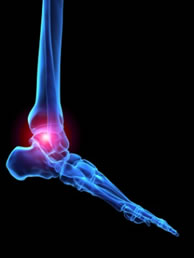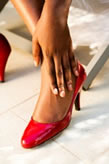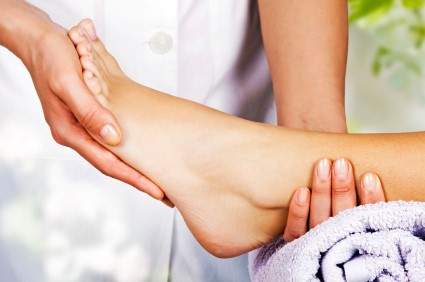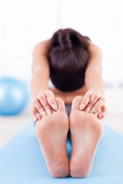Items filtered by date: December 2015
Sisters Suffering from Disease Since Young Age
 16-year-old Isabel and her younger sister Tessa have been battling chronic diseases since they were young. Isabel has idiopathic arthritis, which restricts movement and strains cartilage by filling joints with fluid. However, both Isabel and her sister aren’t shy of physical activity like soccer and are even part of the Arthritis Foundation, a national organization that supports and advocates for arthritis. Their treatments consist of injections, drugs, and chemotherapy to reduce inflammation and hopefully remission of the diseases.
16-year-old Isabel and her younger sister Tessa have been battling chronic diseases since they were young. Isabel has idiopathic arthritis, which restricts movement and strains cartilage by filling joints with fluid. However, both Isabel and her sister aren’t shy of physical activity like soccer and are even part of the Arthritis Foundation, a national organization that supports and advocates for arthritis. Their treatments consist of injections, drugs, and chemotherapy to reduce inflammation and hopefully remission of the diseases.
Arthritis can be a difficult condition to live with. If you are suffering from arthritic foot pain, contact Dr. Joshua David Scoll of Pennsylvania. Our podiatrist can treat your foot and ankle needs.
Arthritic Foot Care
Arthritis is a joint disorder that involves inflammation of different joints in your body, such as in your feet. Arthritis is often caused by a degenerative joint disease and causes mild to severe pain in all affected areas. On top of this, swelling and stiffness in the affected joints can also be a common symptom of arthritis.
In many cases, wearing ill-fitting shoes can worsen the effects and pain of arthritis. Wearing shoes that have a lower heel and extra room can help your feet feel more comfortable. In cases of rheumatoid arthritis, the arch in your foot may become problematic. Buying shoes with proper arch support that contour to your feet can help immensely.
Alleviating Arthritic Pain
- Exercises that stretch the foot can prevent further pain and injury and increase mobility
- Most of the pain can be alleviated with anti-inflammatory drugs, heat, and topical medications
- Massages can help to temporarily alleviate pain.
It is best to see your doctor for the treatment that is right for your needs and symptoms. Conditions vary, and a podiatrist can help you determine the right method of care for your feet.
If you have any questions about arthritic foot care, please feel free to contact our offices located in Bensalem and Philadelphia, PA. We offer the newest diagnostic and treatment technologies for all your foot and ankle needs.
Ways to avoid Damage from High Heels
 Love heels but don’t know what to do about the damage it’s causing to your feet and back? Consider buying heels that have stacked heels, which are thicker and may be more comfortable to walk in because of the support. When walking in heels, walk from your heel to toe, following each step. When buying heels, it’s also important to buy your exact size. Find heels that are not too narrow and pointy, and give your feet breathing room when you’ve been wearing heels for too long.
Love heels but don’t know what to do about the damage it’s causing to your feet and back? Consider buying heels that have stacked heels, which are thicker and may be more comfortable to walk in because of the support. When walking in heels, walk from your heel to toe, following each step. When buying heels, it’s also important to buy your exact size. Find heels that are not too narrow and pointy, and give your feet breathing room when you’ve been wearing heels for too long.
High heels have a history for causing foot and ankle problems. If you have any concerns about your feet contact Dr. Joshua David Scoll of Pennsylvania. Our doctor will treat your foot and ankle needs.
Effects of High Heels on the Feet
High heels are popular shoes among women because they are associated with femininity. Despite their appeal, they can cause many health problems if worn too frequently.
What parts my body will be affected by high heels?
- Ankle Joints
- Achilles Tendon – may shorten and stiffen with prolonged wear
- Balls of the Feet
- Knees – heels cause the knees to bend constantly, creating stress on them
- Back – they decrease the spine’s ability to absorb shock, which may lead to back pain. Also, the vertebrae of the lower back may compress.
What kinds of foot problems can develop from wearing high heels?
- Corns
- Calluses
- Hammertoe
- Bunions
- Morton’s Neuroma
- Plantar Fasciitis
How can I still wear high heels and maintain foot health?
If you want to wear high heeled shoes, make sure that you are not wearing them every day, as this will help prevent long term physical problems. Try wearing thicker heels as opposed to stilettos to distribute weight more evenly across the feet. Always make sure you are wearing the proper shoes for the right occasion, such as sneakers for exercising. If you walk to work, try carrying your heels with you and changing into them once you arrive at work. Adding inserts to your heels can help cushion your feet and absorb shock; you can buy either full inserts or metatarsal pads.
If you have any questions, please contact our offices located in Philadelphia and Bensalem, PA. We offer the newest diagnostic and treatment technologies for all your foot care needs.
The Proper Care for Preventing Ingrown Toenails
 While ingrown toenails can become painful and problematic, there are ways to reduce and prevent the pain. Trim straight across and never on a curve while only cutting the tip; you don’t want to cut them too short. Avoid digging the nail clipper into the corner of the nail beds, filing them down is the best option. Wearing shoes with a wider toe box can keep the pressure off the toes, preventing ingrown toenails from occurring.
While ingrown toenails can become painful and problematic, there are ways to reduce and prevent the pain. Trim straight across and never on a curve while only cutting the tip; you don’t want to cut them too short. Avoid digging the nail clipper into the corner of the nail beds, filing them down is the best option. Wearing shoes with a wider toe box can keep the pressure off the toes, preventing ingrown toenails from occurring.
Ingrown toenails can become painful if they are not treated properly. For more information about other cures for swollen feet during pregnancy, speak to Dr. Joshua David Scoll of Pennsylvania. Our doctor will assist you with all of your foot and ankle concerns and answer any of your related questions.
Ingrown Toenails
Ingrown toenails occur when a toenail grows sideways into the bed of the nail, causing pain, swelling, and possibly infection.
Causes
- Bacterial infections
- Improper nail cutting such as cutting it too short or not straight across
- Trauma to the toe, such as stubbing, which causes the nail to grow back irregularly
- Ill-fitting shoes that bunch the toes too close together
- Genetic predisposition
Prevention
Because ingrown toenails are not something found outside of shoe-wearing cultures, going barefoot as often as possible will decrease the likeliness of developing ingrown toenails. Wearing proper fitting shoes and using proper cutting techniques will also help decrease your risk of developing ingrown toenails.
Treatment
Ingrown toenails are a very treatable foot condition. In minor cases, soaking the affected area in salt or antibacterial soaps will not only help with the ingrown nail itself, but also help prevent any infections from occurring. In more severe cases, surgery is an option. In either case, speaking to your podiatrist about this condition will help you get a better understanding of specific treatment options that are right for you.
If you have any questions, please contact our offices located in Philadelphia and Bensalem, PA. We offer the newest diagnostic and treatment technologies for all your foot care needs.
Brain Activity Sheds Light on Peripheral Neuropathy Treatment
 Researchers from McGill University of Montreal found brain activity that can assist in providing treatment for diabetic patients suffering from peripheral neuropathy. Professor Seguela of the neurology and neurosurgery department discovered this by studying the HCN, hyperpolarization-activated cyclic nucleotide-gated, channels and how they transmit pain signals through the ACC. Brain scans found that emotional and cognitive factors can also influence pain of peripheral neuropathy.
Researchers from McGill University of Montreal found brain activity that can assist in providing treatment for diabetic patients suffering from peripheral neuropathy. Professor Seguela of the neurology and neurosurgery department discovered this by studying the HCN, hyperpolarization-activated cyclic nucleotide-gated, channels and how they transmit pain signals through the ACC. Brain scans found that emotional and cognitive factors can also influence pain of peripheral neuropathy.
When dealing with systemic disease of the feet, is extremely important to check the affected areas routinely so that any additional problems are caught quickly. For professional help, see Dr. Joshua David Scoll of Pennsylvania. Our doctors will ensure that your feet receive the care that they need.
Systemic Diseases of the Feet
Systemic diseases affect the whole body, and symptoms usually are displayed in the feet. This condition can make a patient’s ability to walk unbearable. Systemic diseases include gout, diabetes mellitus, neurological disorders, and arthritis.
Gout – is caused by an excess of uric acid in the body. Common symptoms include pain, inflammation, and redness at the metatarsal/phalangeal joint of the base big toe. Gout can be treated by NSAIDs to relieve pain and inflammation, and other drugs that lower the acid levels in the body.
Diabetes mellitus – is an increase in the level of blood sugar that the body cannot counteract with its own insulin. Failure to produce enough insulin is a factor in Diabetes.
Diabetes of the Feet
Diabetic Neuropathy – may lead to damaged nerves and affect the feet through numbness and loss of sensation.
Peripheral Vascular Disease – can restrict the blood flow to the feet, and often times lead to amputation of the feet.
If you have any questions feel free to contact our offices located in Bensalem and Philadelphia, PA. We offer the latest in diagnostic and treatment technology to meet your needs.
